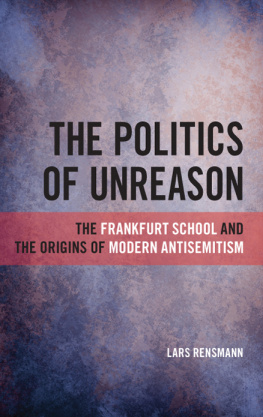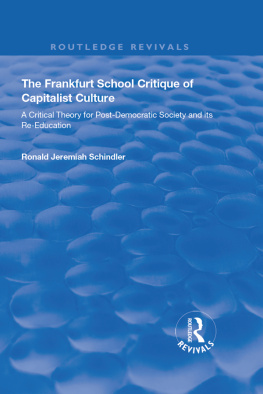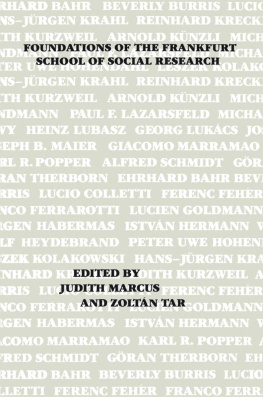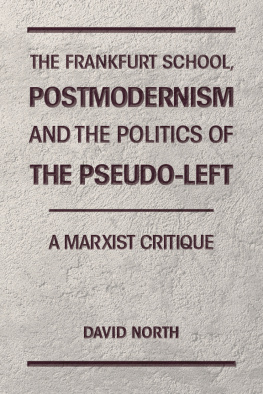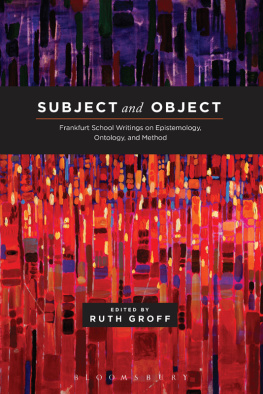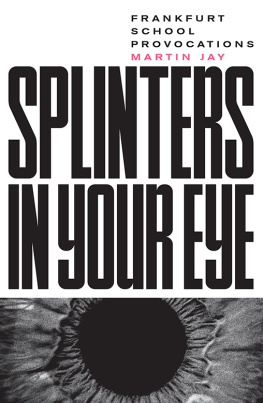Rensmann - The Politics of Unreason: the frankfurt school and the origins of modern antisemitism
Here you can read online Rensmann - The Politics of Unreason: the frankfurt school and the origins of modern antisemitism full text of the book (entire story) in english for free. Download pdf and epub, get meaning, cover and reviews about this ebook. City: New York, year: 2018;2017, publisher: State University of New York Press, genre: Politics. Description of the work, (preface) as well as reviews are available. Best literature library LitArk.com created for fans of good reading and offers a wide selection of genres:
Romance novel
Science fiction
Adventure
Detective
Science
History
Home and family
Prose
Art
Politics
Computer
Non-fiction
Religion
Business
Children
Humor
Choose a favorite category and find really read worthwhile books. Enjoy immersion in the world of imagination, feel the emotions of the characters or learn something new for yourself, make an fascinating discovery.
The Politics of Unreason: the frankfurt school and the origins of modern antisemitism: summary, description and annotation
We offer to read an annotation, description, summary or preface (depends on what the author of the book "The Politics of Unreason: the frankfurt school and the origins of modern antisemitism" wrote himself). If you haven't found the necessary information about the book — write in the comments, we will try to find it.
Rensmann: author's other books
Who wrote The Politics of Unreason: the frankfurt school and the origins of modern antisemitism? Find out the surname, the name of the author of the book and a list of all author's works by series.
The Politics of Unreason: the frankfurt school and the origins of modern antisemitism — read online for free the complete book (whole text) full work
Below is the text of the book, divided by pages. System saving the place of the last page read, allows you to conveniently read the book "The Politics of Unreason: the frankfurt school and the origins of modern antisemitism" online for free, without having to search again every time where you left off. Put a bookmark, and you can go to the page where you finished reading at any time.
Font size:
Interval:
Bookmark:

SUNY series, Philosophy and Race
Robert Bernasconi and T. Denean Sharpley-Whiting, editors
THE FRANKFURT SCHOOL AND
THE ORIGINS OF MODERN ANTISEMITISM
LARS RENSMANN

An original version of of this book first appeared as Guilt, Resentment, and Post-Holocaust Democracy: The Frankfurt Schools Analysis of Secondary Antisemitism in the Group Experiment and Beyond, in Antisemitism Studies Vol. I, 1 (April 2017), pp. 437.
Published by State University of New York Press, Albany
2017 State University of New York
All rights reserved
Printed in the United States of America
No part of this book may be used or reproduced in any manner whatsoever without written permission. No part of this book may be stored in a retrieval system or transmitted in any form or by any means including electronic, electrostatic, magnetic tape, mechanical, photocopying, recording, or otherwise without the prior permission in writing of the publisher.
For information, contact State University of New York Press, Albany, NY
www.sunypress.edu
Production, Jenn Bennett
Marketing, Kate R. Seburyamo
Library of Congress Cataloging-in-Publication Data
Names: Rensmann, Lars, author
Title: The politics of unreason : the Frankfurt School and the origins of modern antisemitism
Description: Albany : State University of New York Press, [2017] | Series: SUNY series, philosophy and race | Includes bibliographical references and index.
Identifiers: ISBN 9781438465937 (hardcover : alk. paper) | ISBN 9781438465951 (e-book)
Further information is available at the Library of Congress.
10 9 8 7 6 5 4 3 2 1
CONTENTS
ACKNOWLEDGMENTS
This book has been a long time coming. The project originated more than twenty years ago, when I was a young graduate student of political science and political theory at the Free University of Berlin. Back then, I wrote my masters thesis on the Institute for Social Researchcommonly referred to as the Frankfurt School, or Critical Theory with capital lettersand antisemitism. My early research led to the publication of the German book Kritische Theorie ber den Antisemitismus (Argument Verlag, 1998), which to my surprise was widely received and found a positive academic echo. I subsequently published articles on the subject, and the Frankfurt Schools work also played an important role in shaping the theoretical framework of my PhD thesis and second monograph on antisemitism and democratic political culture, Demokratie und Judenbild (VS Verlag, 2004). While my primary academic research interests shifted to other issues and areas of political science and political theory, I always intended to return to my early work on the Frankfurt School and antisemitismrevisit my research, pick up important threads, close gaps and rethink lose ends, and finally add a comprehensive English volume on the subject.
In its ideational origins, The Politics of Unreason can be traced even further back: namely to 1992, when I had just graduated from Luther College in Iowa. I had the unique opportunity to visit one of the founding fathers of Critical Theory in the twentieth century and a member of the inner circle of the Institute for Social Research: Leo Lwenthal.
Lwenthal had escaped from Nazi persecution to find refuge in America, where he continued his academic career at prestigious institutions of higher learning. Responding to a letter I had written to him, Leo was so incredibly generous to invite me, the twenty-two-year-old student, to come to visit him, the ninety-one-year-old professor, in Berkeleywhere he taught sociology at the University of California since 1956and to stay at his home. So I did, and we spent days talking about Critical Theoryan experience I will never forget. In my conversations with Leo, for the first time I fully grasped the Frankfurt Schools rich historical and philosophical trajectories and Critical Theorys potential as a living tradition that can be relevant in the contemporary world. Leo Lwenthal passed away just half a year later, before I could visit him again. But much of my academic work is inspired by him, from my first theoretical musings to my later work on the Frankfurt School, political sociology, the radical right, and authoritarian politics of resentment; and so is this book in particularin which Leos academic research and theorizing play a major role. In this study, Lwenthals contribution to the Frankfurt Schools thinking about the antisemitic question is attributed the central place in the scholarly canon it thoroughly deserves. For him, as he told me then, the problem of antisemitism remained a pressing concern of our time. The book is, like my first one almost two decades ago, dedicated to the memory of Lwenthal, one of the great intellectuals of the twentieth century.
While in recent years some new studies have been published that address the relationship between the Frankfurt School and the problem of antisemitism, including pathbreaking contributions by Jack Jacobs and Eva-Maria Ziege, The Politics of Unreason is the first systematic study of the Frankfurt Schools research on and theories about antisemitism in English. Considerable parts of this books research go back to my original study, which still also largely serves as the conceptual and theoretical backbone, and several chapters have been translated from German before being thoroughly reworked, revised, and supplemented.
The book is greatly indebted to many friends, colleagues, and institutions that took part in its production. First and foremost, Kizer S. Walker took a very prominent role: he translated several chapters of the German book, which found their way into five newly designed chapters of The Politics of Unreason. I had the great pleasure to work with Kizer Walker on this manuscript, without whom this book would simply not exist. Kizer is not just an outstanding scholar of Jewish and German Studies, and an expert on Critical Theory, antisemitism, and German philosophy. He is also an amazing translator, the best one could imagine, a fact from which this work greatly benefited. Kizer spent hundreds and hundreds of hours on this book project, for which I will never be able to thank him enough.
My wonderful colleague and cherished friend Jennet Kirkpatrick is the only person who, apart from the copy editor Pat Hadley-Miller, read and tirelessly discussed with me every chapter and every line of the manuscript. In 2009, when we were both still teaching at the University of Michigan, Jennet and I started a working group with weekly meetings to discuss each others research, and we have been meeting every week since then, though mostlyas we are now living and teaching on different continentsvia Skype. Jennets intellectual rigor, collegiality, and knowledge of political theory played a crucial part in the development, reshaping, and final presentation of my arguments. I do not know what the book would be without Jennets contribution and incredible capacities as a meticulous and critical reader. The book would also literally never have seen the light of day without the support of two other fantastic colleagues: Jonathan Judaken, who encouraged me to go back to the subject of the Frankfurt School and antisemitism. Moreover, Jonathan went out of his way to contact publishers to find a suitable press for my study. This enthusiasm found its match with Robert Bernasconi, whose praise of my work on Critical Theory and antisemitism was energizing and who initiated the birth of this book by proposing it for the State University of New York Presss
Font size:
Interval:
Bookmark:
Similar books «The Politics of Unreason: the frankfurt school and the origins of modern antisemitism»
Look at similar books to The Politics of Unreason: the frankfurt school and the origins of modern antisemitism. We have selected literature similar in name and meaning in the hope of providing readers with more options to find new, interesting, not yet read works.
Discussion, reviews of the book The Politics of Unreason: the frankfurt school and the origins of modern antisemitism and just readers' own opinions. Leave your comments, write what you think about the work, its meaning or the main characters. Specify what exactly you liked and what you didn't like, and why you think so.

